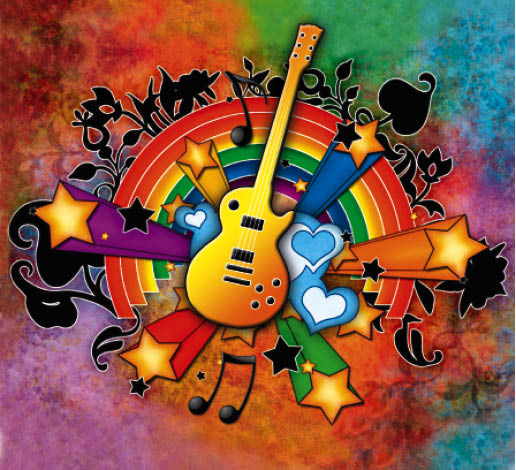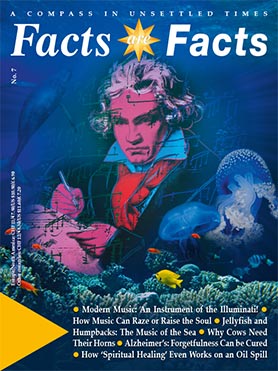Rock Music Report: In the Service of the Illuminati
Once upon a time it was the “Make Love, Not War” ethos of the Flower Children that ruled the airwaves. Yet today’s music superstars are simply puppets for the Illuminati and their totalitarian “New World Order”. Read on to discover the untold story of a phenomenon of our times, without which the modern world would be very different.
Hardly had the shocking news of Michael Jackson’s death been broadcast across the world on 25 June 2009 when whispers broke out that it wasn’t actually death by natural causes. A few days after his demise, the media joined forces to declare that an overdose of Propofol, administered by his personal doctor, had unwittingly dispatched Jackson to a sleep from which he would never wake. After all, let’s not forget that a mass belief in something has probably been paid for by someone.

Among the many reports from rumour mills all over the world, one in particular stood out, which linked Jackson’s death to a different, equally bizarre, cause: swine flu. “FSB sources are reporting to President Medwedew today that American pop icon Michael Jackson was ‘most assuredly’ assassinated by the US Central Intelligence Agency (CIA) after an examination of data transmitted by a Russian Military’s Kosmos 2450 satellite shows ‘conclusively’ that immediately prior to the music star’s death in Los Angeles an electromagnetic pulse consistent in pattern to EMR weapons looted from the former Soviet Union by the United States was employed at the ‘exact coordinates’ of the rock star’s home.”
These microwave weapons, originally the result of Soviet research and then perfected by American arms companies, would lead to “disoriented human behavior, nerve disorders or even heart attacks,” reported Cheryl Welsh, President of Citizens Against Human Rights Abuse, as early as 2001 in her startling report Electromagnetic Radiation (EMR) Weapons: As Powerful As The Atomic Bomb. She had taken the facts from a report released by the U.S. Defense Intelligence Agency.
Jackson himself provided the reason for his assassination: in an out-of-court agreement, the pop star had allegedly promised the son of the King of Bahrain, Sheik Abdullah bin Hamad al-Khalifa, that he would use his fifty sold-out London concerts as a platform from which to warn the world about an imminent mass genocide. This would be in exchange for the many millions previously lent to the hard-up musician by the oil sheikh’s son.
Granted, this claim doesn’t quite pass muster on two points: why the Sheikh’s son considered it worth several million dollars to get Jackson to shock the world, and of course the “genocide” issue. This throws up a lot of questions, not least: what would a pop star have been able to do about it from a stage anyway? And as we now know, no such genocide actually took place. Nevertheless, former Finnish Minister of Health Rauni Kilde is convinced that the “world elite” were planning to eliminate up to two-thirds of the population by means of cloned swine flu viruses or the vaccines ostensibly meant to prevent it—as decided at the Bilderberger conference in May 2009 in Greece, and as suggested by Henry Kissinger.
As a result, we have plenty of “woulds” and “coulds”, but no real certainty about any of it. A different version of the story holds that Jackson was effectively murdered by the secret service, simply because they feared that the fifty concerts (with their millions of attendees) would have presented an insurmountable health risk in the light of raging swine flu. The two versions contradict each other only superficially: the planned elimination of up to two-thirds of the world’s population1 is still a transnational “top-level” issue—meaning that state institutions don’t necessarily have to be informed. At the end of the day, they still see it as their job to save people’s lives.
Regardless, the “King of Pop” died with Michael Jackson, a fairy-tale figure who was first black, then white; someone who achieved Olympian heights from what was then still a racially divided black lower class, someone who, to a certain extent, represented the pinnacle of everything “black music” had brought to the world—passion, lust and forbidden dreams—yet distanced himself from it all and lived an almost fairytale childlike-ness. No other musician has ever been transfigured so messianically, or demonised so diabolically; treated with such adoration or calumny as Jackson. A life on the fast lane, which—as he himself prophesied—had to end prematurely and unnaturally at some point.
Dark Roots
The modern, rhythmic music that we like and don’t particularly want to give up wasn’t exactly inspired by one of the seven heavens. English musician and mystic Cyril Scott—who was among other things a pupil of the “Masters of Wisdom” known as “Mahatmas”—wrote in his inspired book Music—Its Secret Influence Throughout the Ages about the forerunners to rock ‘n’ roll and their effects on society: “After the dissemination of Jazz, which was definitely ‘put through’ by the Dark Forces, a very marked decline in sexual morals became noticeable. Whereas at one time women were content with decorous flirtation, a vast number of them are now constantly preoccupied with the search for erotic adventures, and have thus turned sexual passion into a species of hobby. Now, it is just this over-emphasis of the sex-nature, this wrong attitude towards it, for which Jazz-music has been responsible. The orgiastic element about its syncopated rhythm, entirely devoid of any more exalted musical content, produced a hyper-excitement of the nerves and loosened the powers of self-control. It gave rise to a false exhilaration, a fictitious endurance, an insatiability resulting in a deleterious moral and physical reaction. Whereas the old-fashioned melodious dance-music inspired the gentler sentiments, Jazz, with its array of harsh, ear splitting percussion-instruments inflamed, intoxicated and brutalized, thus causes a set-back in Man’s nature towards the instincts of his racial childhood. For Jazz-music at its height very closely resembled the music of primitive savages. A further result was to be seen in that love of sensationalism, which has greatly increased. As Jazz itself was markedly sensational, the public has increasingly come to demand ‘thrills’ in the form of ‘crook dramas’ and plays, the only dramatic interest of which is connected with crime, mystery and brutality. This also applies to sensational fiction: for the output and sale of this type is prodigious. The widespread and exaggerated interest taken in prizefights is another symptom of sensationalism.
“The latest cumulative effects of Jazz,” Scott wrote in the Sixties, “is rock ’n roll and those hysterical and unruly hero-worshipping exhibitions on the part of female teenagers aroused by the good looks and performances of some male crooner. Further, matters of sex are so bruited abroad that one can hardly open a single paper without being confronted with photos of almost naked women. In addition, the vulgar elements in Jazz combined with its other ones have had such vulgarising effects, that we now have the misfortune to live in a vulgar and blatant age.”
Cyril Scott’s words may seem extremely old-fashioned and moralising to you. Yet Scott was neither. The text is simply intended to show us how far we’ve come in the last sixty years from what was once considered normal throughout the ages! The extreme emotionalisation of society, which we take for granted today, is a recent phenomenon that has lead to a grave weakening of willpower and discipline, which ultimately makes individual life a rollercoaster journey. These days, practically the only place you will find ambition, vision and endurance in difficult situations is professional sport, which in turn all too often represents one of the usual, desperate needs for sensation for most of its consumers.
What was sold to us as sexual liberation through music—as “liberation in general”—doesn’t really live up to what was promised; instead it has made millions of people dependent on external stimuli that do everything but lead them to inner freedom! Of course, the Church spent centuries making sexuality a kind of unnatural taboo—and each extreme only serves to provoke its opposite. This came in the form of “rock ‘n’ roll”, which is incidentally a slang expression for sexual intercourse and first appeared in black Rhythm and Blues songs.
Rock Begins to Roll…
The beginning of rock ‘n’ roll is always described as the “The yearning of youth for their own music, through which rebellion against their parents could be expressed”. In truth, new music trends are fabricated, of course. If there is no record company to award itself fat profits from the “new direction”, no medium to play the songs and no press or marketing to make the singer famous, then that “yearning” doesn’t make it beyond the backyard—if there is such a thing in the first place. In no way is it a natural development wherein youngsters just have to revolt against their parents—even today there exist cultures, for example in Mongolia, where no child (regardless of age) would ever be allowed not to be obedient to its parents. The disadvantage of this, of course, is that a society gets too deeply mired in traditions that are not always wholly beneficial. And indeed, in the last few decades, certain spiritual energies have been flowing into the Earth; energies that awaken people’s thirst for freedom—freedom from old forces that feel outdated and obsolete. Yet did this urge have to get so out of hand?
In the case of rock ‘n’ roll, it was Hollywood’s film industry that propelled its international breakthrough. “Many people said this story could not, must not, dared not be shown,” announces the Blackboard Jungle film trailer magniloquently. “Blackboard Jungle deals with the explosive subject of teen-age terror in the schools.” The film first appeared in 1955—44 years before the first school shooting at Columbine High School in Littleton, Colorado. It portrays pupils with drawn knives attacking their teacher. The film’s theme song was Bill Haley’s Rock Around the Clock, which became a huge hit around the world. The film’s message was promptly followed by its target audience: rebel against your oldies; if necessary, even with violence.
At first the American public were shocked at what was happening. From the 1920s, but particularly from the beginning of the rock ‘n’ roll era, big record companies across the country had been bribing DJs to give the music (and the stars on their books) more airplay—which of course had a huge impact on the Hit Parade and the development of musical taste in general. Eventually, the whole scandal came to light. The Federal Communications Commission investigated 25 DJs for corruption and demanded detailed information from 5,300 radio and TV stations about their programming and financial benefits under oath. “A wave of hysteria broke out. There were denunciations, DJs were threatened anonymously, radio and TV stations monitored their employees, or subjected them to a lie detector test. In public, the media pushed the notion that Payola2was only to do with rock ‘n’ roll, or had only arisen in connection with this music style. The attitude of the overwhelming majority that rock ‘n’ roll was rotting and endangering the minds of young people got stoked up even further by its association with criminal intrigues. As a result, less and less rock ‘n’ roll was played on the radio and TV—firstly to respond to public pressure, and secondly not to attract the ill-will of influential interest groups, who regarded rock ‘n’ roll as a kind of ‘threat to national security’. (…)
“Public pressure, religious organisations and state intervention limited or removed rock ‘n’ roll first from the media, and then, at the end of the 1950s, lead to its general ostracism. As a result, the stars withdrew from the music scene completely or sought sublimation through an extremely adapted behaviour to gain renewed access to the masses and commercial success. Thus Little Richard turned to theology in his conviction that rock ‘n’ roll was made by the devil. Gene Vincent emigrated to England. Elvis Presley reported for military service to get back into society’s good graces. Returning from duty ‘cleansed’, he started producing hits or love songs of a more mainstream nature. The simultaneous death of the Big Bopper, Buddy Holly and Richie Valens in one single plane crash in 1959, as well as the death of Eddie Cochran in 1960, sounded the death knell for rebellious rock ‘n’ roll.”3
…With Destructive Effect
In world history there are no coincidences. Much of what seems purely “the way the wind blows” has in truth been carefully planned by the “puppeteers of world history”. One of their aims is to destroy the idea of the family as a normal lifestyle. (In the USA, the divorce rate in the 1950s was 7 per cent; today it’s already over 75%!) This is partly because same-sex couples or promiscuous singletons don’t have offspring, at least since the invention of the pill (which is ‘good’ in terms of population reduction), and partly because children from broken homes often don’t want a family of their own—which serves the Illuminati agenda perfectly and gives the state an excuse to take children into its care, where they are taught the ‘appropriate’ ideas from the cradle. In addition, mankind is supposed to be made ever more dependent on all sorts of stimulants—alcohol, cigarettes, drugs, sexual experiences, music and films that trigger strong emotions. People with no self-discipline or ambition don’t defend themselves against these chains, or to being kept “happy” with bread and circuses. And evidently they wouldn’t want it any different. While they hanker after the next form of titillation, the puppeteers are changing the world according to their own ideas.
Effects of the music
Rock music did not simply emerge—please read the article on page 28. Scientists working for the elite took great care to research precisely which sounds and rhythms make a society decadent, since sound has the power to build and destroy worlds: “Throughout the ages, philosophers, religionists and savants have realized the supreme importance of sound. In the Vedas, said to be the oldest scriptures in the world, it is stated that the whole cosmos was brought into manifestation through the agency of sound,” writes Cyril Scott in his book. “It has been proven that sound can be both constructive and destructive: it can create forms, it can also destroy forms. From a chaotic sprinkling of sand on a glass plate, geometrical patterns may be formed with the aid of a violin-bow drawn across the edge of the plate; a fact which goes to prove the constructive effect of sound-vibrations. Conversely, the sound of the human voice may be employed to shatter a tumbler or wine-glass to atoms.”
Even the Ancients had thoughts about the effect of sound: “Musical training,” writes Plato, “is a more potent instrument than any other, because rhythm and harmony find their way into the inward places of the soul, on which they mightily fasten, imparting grace, and making the soul of him who is rightly educated, graceful.” Plato had such a strong opinion on the effects of music that he writes in another part of his work The Republic: “For the introduction of a new kind of music must be shunned as imperilling the whole state; since styles of music are never disturbed without affecting the most important political institutions.”
As this report by broadcaster N24 on 24 February 2010 says:
Rammstein is “Enemy of the State” to Belarus
“Rock band Rammstein should be worried about their concert in Belarus. The autocratic regime of Belarus has declared the German industrial rock band Rammstein to be an enemy of the state, because their lyrics deal with ‘perversions’. The musicians would ‘destroy the Belarusian state order’, according to the Morality Commission supported by President Alexander Lukaschenko with respect to a planned concert in Minsk on 7 March 2010. Rammstein songs are allegedly propaganda for ‘violence, masochism, homosexuality and other perversions,’ directed against Belarusian values. Thus ‘permission for a Rammstein concert is a mistake that can cost us greatly.’”
Unfortunately, you’d be wrong to think that a state has shown unusually great civil courage. The very next day the Belarusian Embassy in Germany hastened to correct the news: apparently the report was based purely on one person’s opinion from the Morality Commission, that of writer Nikolaj Tscherginez. He had “expressed his own personal opinion, which naturally cannot be supported by all Rammstein fans.” The ambassador then blamed those responsible for portraying Belarus in a negative way.
“All speculation about the alleged ban is thus expressly refuted. It is simply wrong. Thousands of spectators from all over Belarus are looking forward to the Rammstein concert on 7 March,” emphasised the ambassador. “You might be interested to learn that it’s already almost sold out.” Evidently decades of brainwashing really have had an impact even on the highest levels of diplomacy.
Sources
- 1 Read more about this in Facts are Facts No. 6: Vaccinations: A Deadly Injection?
- 2 The term Payola comes from the words ‘pay’ and ‘Victrola’ and stands for the “pay for play” process.
- 3 Wikipedia







